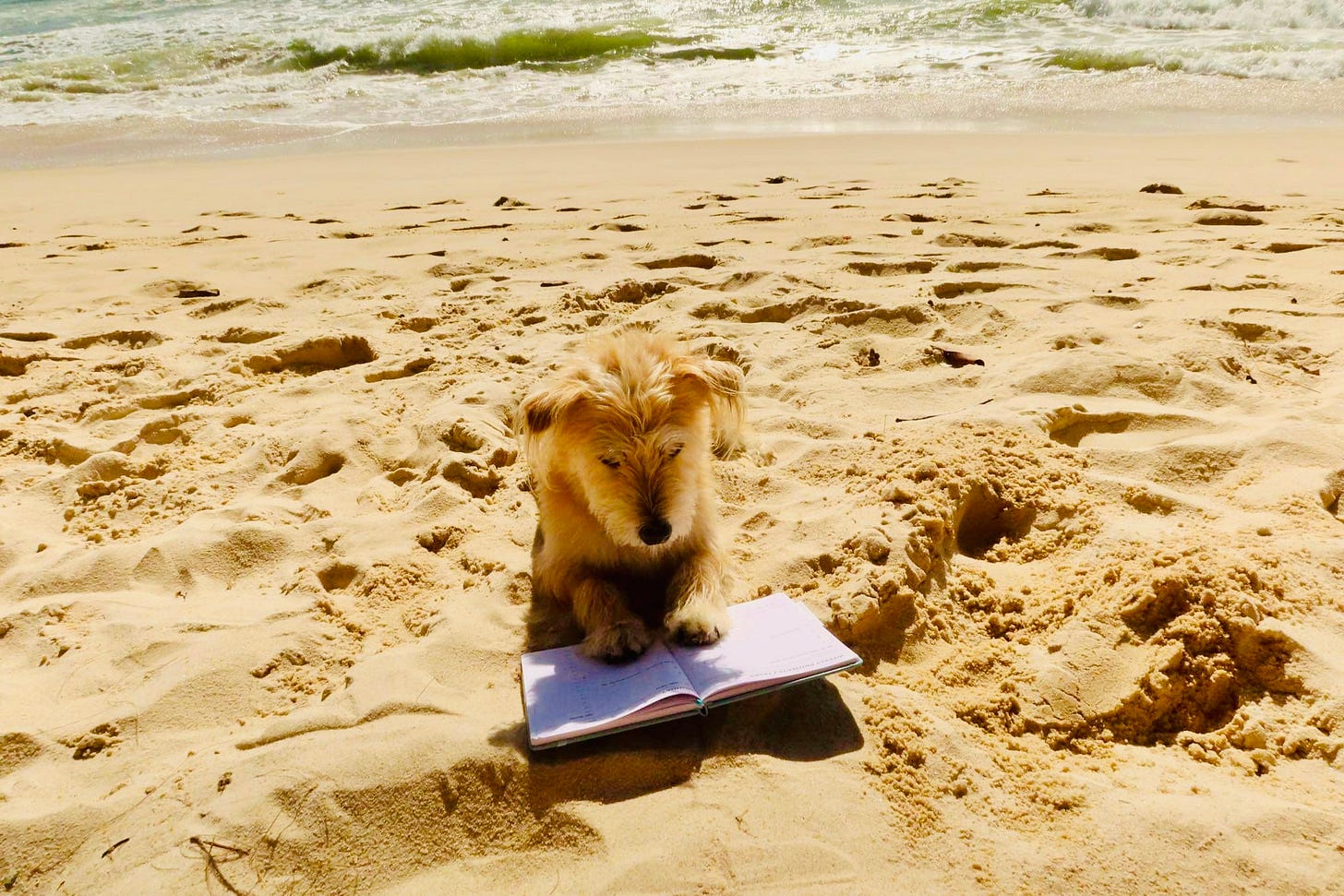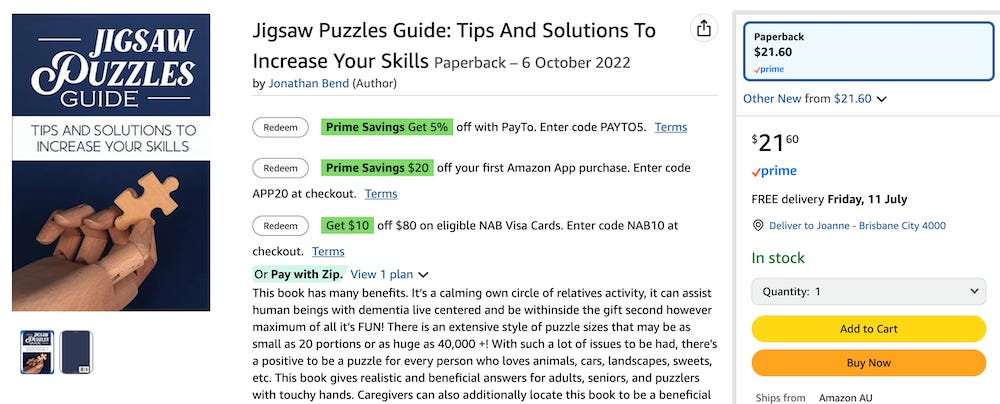How to Turn What You Know Into an Income Stream You Can Run From Anywhere
And why being 50+ gives you an unfair advantage...
What was the last course, book, or guide you bought?
Seriously, think about it.
Was it a recipe book?
A guide to growing perfect rhododendrons?
An exercise app with perky 30-year-olds doing burpees in Bali?
Mine was a downloadable guide on Hashimoto’s and the AIP (auto immune protocol) diet. Before that, a quick-fire mini course on how to write better Substack Notes. And before that, a fantastic class on how to take better iPhone photos.
What do all these have in common?
They're all someone else’s knowledge, packaged up into neat little courses, and sold to lifelong learners like me, looking to make life a bit better, easier, or more beautiful.
So let me ask you this: what do you know?
Because chances are, you’ve got a lifetime’s worth of insight, ideas, and lived experience that someone else would gladly pay to learn.
Let’s unpack it. And then let’s package it into income.
Your Everyday Skills Might Be Someone Else’s Missing Piece
A friend of mine is ridiculously good at jigsaw puzzles. She sees patterns I completely miss. She can finish a 1,000-piece puzzle in the time it takes me to figure out the edge pieces.
Out of curiosity, I googled “how to do jigsaw puzzles” and found a guide on Amazon for $21.60. Someone has literally packaged up their puzzle prowess, and people are buying it.
Could my friend sell her jigsaw skills? Absolutely.
My sister’s the same with gardening. She knows more about plants than I know about keeping anything green alive for more than a week.
My husband’s an ex-soccer coach. Another friend is a former hurdling champion (I kid you not), and another is a triathlete. (You know that saying about becoming the average of the five people you spend the most time with? Yeah, not true. All my friends are athletes and I still pull a muscle putting socks on.)
But the point is, every single one of these people could package and sell what they know.
And so could you.
What do you know? What do you do almost without thinking, that others would love to learn?
Why What You Know Matters (And Always Will)
Everything we do is built on someone else’s knowledge. How to make a curry. How to fix a leaky tap. How to launch a business, raise a child, train a dog, or speak French.
Someone, somewhere, taught us. Through books, videos, school, workshops, blogs, TikTok hacks, YouTube rabbit holes, or good old-fashioned asking your mum.
And we never stop learning.
From cave paintings to university lectures, from handwritten scrolls to Google, humanity has always been on a quest to know more, do better and live smarter.
Apparently the world’s first library was built in Nineveh (an ancient Assyrian city) around 7th century BC, and Plato opened his Academy in 387 BC. Fast forward a few thousand years, and now we’re getting cooking tips from YouTube teens and productivity advice from blokes in hoodies on podcasts.
We used to gather around fires. Then libraries. Then classrooms. Now it’s Substack, Skillshare, Kindle, Kajabi, and clever PDFs landing in your inbox.
From Scrolls to Substack: Why We Still Pay to Learn
What’s interesting is that knowledge is easier than ever to obtain.
Google’s been around since 1998. YouTube arrived in 2005. AI is now rewriting the learning game again, and yet we still pay for knowledge.
We always have. And we always will.
Whether it’s a paid course or a free video with sponsored ads, there’s an exchange happening. Someone has taken what they know, shared it in a way that helps others, and built a life, business, or income stream from that generosity.
Because that’s what knowledge is. It’s not just facts. It’s value.
And now it can be your turn. Your experience, ideas, methods, insights, wins, and even your mistakes — all packaged in a way that helps someone else.
That’s how you can start earning from all your experience, and the raft of skills you've developed over the years.
Why Being 50+ Is the Perfect Starting Point
There’s no expiry date on usefulness. In fact you become more useful the older you get!
If you’re 50 or over, you’ve spent decades collecting stories, learning lessons, and gathering skills, and insights. The kind of experience that doesn’t come from a YouTube tutorial.
You’ve navigated relationships, parenting, work, health, stress, joy, uncertainty. You’ve learned what works, what doesn’t, and you’ve probably helped more people than you realise.
You’ve developed real perspective, practical thinking, emotional intelligence (yep even if the menopause has made you a bit of a fruitcake… just me?) And your stories are interesting.
You know how to adapt, how to spot nonsense, how to teach in plain English and how to listen. And you’ve got a lifetime of wins, stuff-ups, and ‘if I knew then what I know now’ moments that someone else would love to learn from.
And that’s exactly what people want.
They’re not looking for slick. They’re looking for real knowledge from someone they can trust. Someone who understands what it’s like to be in their shoes.
That’s you.
How to Start Figuring Out What You Know
We tend to dismiss the things we’re good at. “That’s just common sense,” we say, forgetting that common sense isn’t all that common.
And there's your edge.
If you're reading this thinking, “I’m not sure what I’d even share,” here’s a simple way to start pulling it out of your brain and onto the page:
Think about the topics you light up talking about. The ones you could chat through over coffee without running out of steam.
Jot down five things people always ask your advice on, even if you think the answers are obvious.
Look for patterns in your life or work. What do you keep doing that others struggle with?
Reflect on the challenges you’ve faced. Health, parenting, career, relationships, travel. What lessons came out the other side?
What you think you need to know doesn’t have to be flashy or profound. It just needs to be helpful.
Start a list. Scribble in a notebook. Open a doc. Capture all the little things you know how to do that others might not.
That’s your foundation.
The 3 P’s Framework: Package, Price, Position
Once you've landed on a couple of ideas, here's how do turn it into something people can buy:
1. Package
Choose a format that feels light and doable.
Start with something small:
A 1-hour workshop on Zoom
A downloadable guide or checklist
A short email series or paid newsletter
A one-off coaching or clarity call
A toolkit, template, or planner
The goal isn’t to teach everything. Just help someone move forward more easily.
2. Price
Pricing is so much more about usefulness and transformational value than it is about credentials.
But don't feel pressured to 'charge what you're worth'. Not in the early days.
Start with something like:
£27 for a guide
£47 for a mini-workshop
£97 for a one-off session
You can always tweak it and raise prices once you have some testimonials and social proof. The key is starting.
3. Position
This is where most people get vague, but where your clarity can shine.
Who’s it for? What are they stuck on? Why are you the one to help?
Examples:
“I help women in their 50s build a digital income stream from scratch.”
“I teach non-techy creatives how to build simple sales pages.”
“I help retired teachers turn their lesson plans into digital products.”
The more specific you are, the more your people will find you.
The Quickest Way to Start
If I were starting from scratch today, I’d do this:
Choose one problem you can help with
Create a 1-page PDF or outline a 45-minute Zoom session
Share it in a Facebook group, email, social post, or here as a Substack post or note
Offer it to five people for a small price in exchange for feedback
Use that feedback to tweak and relaunch
That’s it. Your first offer is live.
Most people wait for perfect. But progress comes from getting messy.
(NB: I watched a movie yesterday where the lead told her co-lead - “Failure is the best teacher. Dare to Fail”)
Mistakes to Avoid
Let’s keep this simple. Here’s what tends to trip people up:
Trying to teach too much at once
Thinking you need a big audience
Overcomplicating the tech
Waiting to feel ready
You just need one clear offer, a few people, and a willingness to try.
This Is Bigger Than Income
Packaging your knowledge can fund your travel, your projects, or your next big plan.
But something else happens when you turn your experience into something that helps others. You start seeing your past differently. You stop questioning your worth and you begin to realise how much you actually know.
It builds confidence, energy, and momentum.
You stop asking, “What do I have to offer?” and start saying, “Actually, I’ve got plenty.”
Your Next Step
You don’t need to launch a big program.
Just choose one idea. One person you want to help. One simple way to help them.
Then start.
What you know is more valuable than you think. And someone out there is ready for it.
Let’s get it out of your head and into the world!





Marvelous! And I chuckle a bit because mine would be a bit more like an appetizer menu of random insights, pick one take a nibble, move on. 🤭😂
I read this and thought, “but…”
What I’m good at is helping people see things differently. I need a presenting problem before I can do that. And I can’t package that.
Then I realised, I needed to see things differently! I have a whole heap of tools which I use to analyse a problem or a project to find those ways of seeing things differently. And I can certainly package those.
Thank you